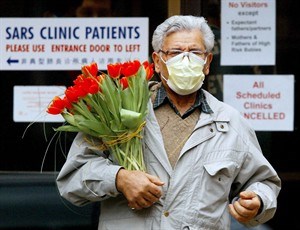
A man wears a protective mask as he carries a bouquet of flowers at Women's College Hospital in Toronto March 28, 2003. Global health officials are closely following a new respiratory virus related to SARS that is believed to have killed at least one person in Saudi Arabia and left another person in critical condition in Britain. THE CANADIAN PRESS/Kevin Frayer
September 24, 2012 - 5:26 AM
LONDON - British health authorities have alerted the U.N. of a new respiratory virus that resembles SARS in a severely ill patient who recently travelled to Saudi Arabia — where another man died of a similar illness earlier this year.
The man in the new case was sickened by a coronavirus, which causes most common colds but also causes SARS, or severe acute respiratory syndrome. In 2003, SARS killed hundreds of people, mostly in Asia, in a short-lived outbreak.
Britain's Health Protection Agency and the World Health Organization said in statements that the 49-year-old Qatari national became ill on Sept. 3, having previously travelled to Saudi Arabia. He was transferred from Qatar to Britain on Sept. 11 and is being treated in an intensive care unit at a London hospital for problems including kidney failure.
The Health Protection Agency said it was unaware of any ties the patient had to Britain but that he likely was in a private clinic in the Middle East before being transferred to a London hospital. None of the health workers involved in his care has so far fallen ill with any flu-like illnesses, the agency said.
The U.N. health agency says virus samples from the patient are almost identical to those of a 60-year-old Saudi national who died earlier this year.
Experts said it was unclear how dangerous the virus is. "We don't know if this is going to turn into another SARS or if it will disappear into nothing," said Michael Osterholm, a flu expert at the University of Minnesota. He said it was crucial to determine the ratio of severe to mild cases.
Osterholm also said more information was needed on how the virus is spread — whether it's spread as easily as a common cold or, as in the case of SARS, mostly through close contact and via specific medical procedures like a lung intubation.
He said it was worrying that there had been at least one death from the new virus.
"You don't die from the common cold," he said. "This gives us reason to think it might be more like SARS." The SARS virus was particularly deadly and killed about 10 per cent of the people it infected.
The World Health Organization says it is trying to determine the public health implications of the two cases but isn't currently recommending travel restrictions.
Officials are also concerned the upcoming Hajj pilgrimage next month could provide more opportunities for the virus to spread. The Hajj has previously sparked outbreaks of diseases including flu, meningitis and polio.
___
Frank Jordans in Berlin contributed to this report.
News from © The Associated Press, 2012